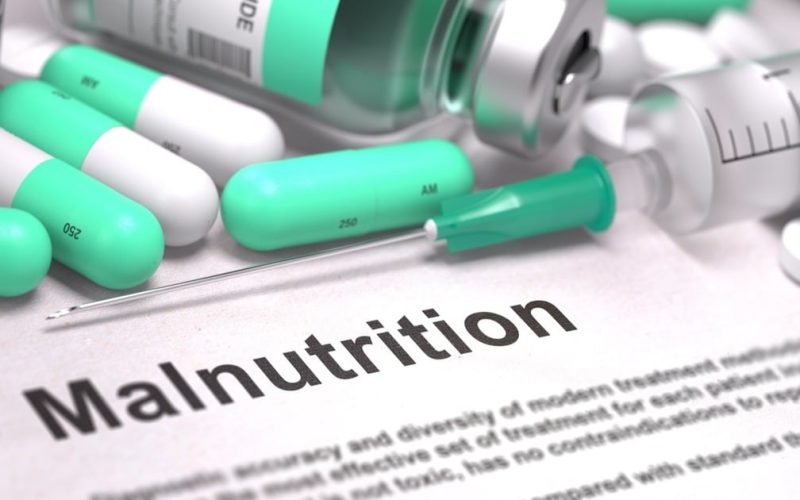Malnutrition is a medical condition that is characterized by lack of proper nutrients; it can be caused by poverty (not having enough food to eat), or not eating enough of the right foods (eating mainly junks and processed foods) or inability to utilize the nutrients obtained from food eaten (usually caused by an underlying medical condition).
It makes the body unable to function properly; note that malnutrition can also be caused by high intake of a particular nutrient or type of food, or too low intake and it can be caused also by a poorly balanced intake of nutrients.
There are four leading causes of illnesses and death globally; there are:
- Accumulation of toxins in the body
- Malnutrition and nutritional deficiencies
- Exposure to electromagnetic chaos
- Stress
As we can see, malnutrition is the second leading cause of illnesses and death globally; this is a serious medical condition that requires immediate attention if not it can result in serious medical complications and even deaths.
In cases of severe of severe malnutrition, artificial nutritional support is needed; the patient can be feed by enteral or parenteral feeding. In enteral feeding, a tube is used to pass a liquid food directly into the stomach and in parenteral feeding; a sterile liquid is fed directly into the bloodstream.
Prevention is the best treatment for this condition in children because even when treated; behavioral and intellectual functions that were affected develop slowly and this leads to learning difficulties.
Even with treatments, there can be long-term effects on mental functions and digestive processes. In some cases it is life-long but an adult with severe malnutrition that started during adulthood usually makes a full recovery with treatment.
Millions of people globally are affected by malnutrition, according to The World Health Organization (WHO), 462 million people worldwide are malnourished.
159 million children globally are suffering from stunted growth due to poor nutrition; even those obese individuals who eat mainly fast foods, junks and drink excessively can be suffering from it because the body might be getting these foods lack the vital nutrients that the body requires.
Risk factors for malnutrition
- Age: Elderly people are at risk of this due to poor appetite. Those in elderly institutions or those hospitalized are more prone to malnutrition than the rest.
- Poor people: Low-income earners or those who don’t even have a job are prone to malnutrition because they cannot afford quality meals; they end up eating mostly cheap junk and empty-calorie foods.
- People recovering from diseases: Diseases like stroke and multiple sclerosis can affect a person’s ability to eat.
- Individuals who are socially isolated: These people are also at high risk of malnutrition.
- People with mental health problems: Mental conditions like depression, dementia, schizophrenia, anorexia, and bulimia are at risk of malnutrition.
- People with chronic diseases: Chronic diseases and eating disorders like anorexia and bulimia nervosa can affect the intake of food and disrupt healthy eating patterns.
Symptoms of malnutrition
Common signs and symptoms of malnutrition are:
- Lack of appetite
- Lack of interest in food and drinks
- Irritability and constant fatigue
- Always feeling cold
- Weight loss
- Loss of body fat, muscle mass and body tissue
In severe cases of malnutrition; signs and symptoms includes:
- Difficulty breathing
- The hair become sparse and dry and falls out easily
- The eyes sink in
- The cheeks becomes hollow and fat disappears from the face
- The skin becomes thin, dry cold, pale and it loses its elasticity
- They can be heart failure and respiratory failure; this makes the person unresponsive. Total starvation is fatal within 8 to 12 weeks.
The adverse effects or health complications of malnutrition
The typical adverse effects of malnutrition are:
- Reduced muscle and tissue mass
- Low body weight and muscle wasting
- Decreased stamina and mobility due to muscle wasting
- Healing of wounds take longer time
- Lack of energy
- Reduced social skills
- Organ failure
- Poor posture
- Longer time needed to recover from illnesses
- It makes the body susceptible to diseases and infections
- Weak or suppressed immune system
- Slower immune responses in fighting infections
- Always feeling cold and difficulty staying warm
- Inability to maintain normal body temperature (hypothermia)
- Poor libido (low sex drive)
- It leads to stunted growth in children and abnormal growth and development
- Fertility problems
- Mental problems like memory impairment, foggy thinking and difficulty concentrating and making decision
Causes of malnutrition
Poor appetite: This can lead to malnutrition if not treated; poor appetite can be caused by excessive consumption of alcohol, an underlying medical condition and other reasons.
Poverty: Low income earners or people without a means of income find it difficult to eat healthy; this makes them eat more of junks or a particular class of food (like carbohydrates), this leads to malnutrition.
Psychological reasons: Some psychological reasons and mental problems can lead to malnutrition; this includes depression, grief, emotional trauma, anxiety, bulimia and other eating disorders.
Lack of breastfeeding: Not breastfeeding an infant can lead to malnutrition in infants and children.
Digestive problems: Stomach problems and digestive disorders can lead to inability of the body to absorb and utilize nutrients. Ulcers, crohn’s disease, coeliac disease, irritable bowel syndrome, irritable bowel disease, vomiting and diarrhea are all digestive problems that can lead to impairment in the absorption and utilization of nutrients.
Social and mobility problems: Some people have busy schedule and they find it difficult to create time to cook healthy meals; others have limited cooking skills and find it difficult to prepare meals, some cannot leave the house to buy food because of physical challenges. Those who are isolated and those who live alone are at higher risk of malnutrition.
Excessive intake of Alcohol: Alcohol is one leading cause of malnutrition worldwide; it leads to poor appetite first by disconnecting people from the feeling of hunger and it changes the taste of foods in the mouth.
Medical problems: Most medical conditions cause a loss in appetite which can lead to malnutrition; some of these conditions include cancer, stroke, chronic digestive disorder, multiple sclerosis and mental disturbances.
How to prevent malnutrition?
The best treatment for malnutrition is prevention; adequate knowledge should be gained on foods and their functions, no matter how busy one is, time can be created to cook healthy meals, you don’t need to spend your whole day in the kitchen before you eat.
When you decide to buy cooked food from outside; make sure it is healthy, avoid junks and noodles, go for healthy foods. It is advisable to pick a job or learn a new trade that can give you a source of income or increase your income so that you can eat well.
Although we don’t live to eat; we eat to live, eating the right foods regularly will make you live long to carry on whatever dream goal you have; so investing in good food is a good investment that pays richly.
There is no excuse for not knowing how to cook; you can ask a friend or go online and read on how to cook. There are many free online cooking courses and videos and there are some that requires payment, you can choose the one you want but this is an age of enlightenment and ignorance is no longer an excuse because knowledge is everywhere.
If you are the super busy type; then you can employ a chef to help you cook nutritious meals and breastfeeding mothers should eat well and breastfeed their babies well to avoid the consequences of malnutrition.





